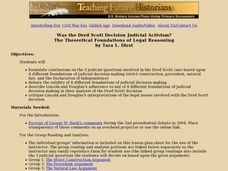iCivics
Mini Lesson: Judicial Activism and Restraint
Scholars analyze the United States judicial branch as it pertains to activism and restraint. They use research to define the roles the courts play while at the same time investigate current events to identify how the media covers those...
C-SPAN
Judicial Review and Marbury v Madison
The Supreme Court case Marbury v. Madison may not be widely recognized but the landmark case is particularly significant because it established the precedent for judicial review and that the Supreme Court had power as an interpreter of...
iCivics
The “Supreme” in Supreme Court
Does a public school have the right to restrict what t-shirts learners wear? Discover what happened when this question was brought to the Supreme Court, and review other major cases in United States history involving judicial review....
Curated OER
Judicial Branch & Supreme Court Questions
In this U. S. government worksheet, students respond to 19 short answer questions about the responsibilities of Supreme Court members in the United States.
Curated OER
Supreme Court: Practice with Precedents 2010
Eleventh graders examine the term precedent in the court system. In this American Government lesson, 11th graders research various court cases in history. Students create a study chart that shows comparisons of these cases.
State Bar of Texas
Marbury v. Madison
Who has the final say in matters dealing with the rules under the United States Constitution? The case Marbury v. Madison brings to light the issue of judicial review. Learners investigate the Supreme Court's opinion in the case with a...
Judicial Learning Center
The U.S. Supreme Court
How do Supreme Court justices determine which cases to consider? What happens when the Supreme Court decides not to take a case? The lesson explores important questions and others in the field of criminology. It focuses on the appeals...
Curated OER
Worksheet #48 Questions - United States Judicial System
In this United States judicial system quiz learning exercise, students answer ten fill in the blank questions over the aforementioned subject.
Curated OER
Mueller v. Allen
Students investigate a First Amendment legal case involving religion, education, and reimbursement of tuition payments. They research the background of the cases and its precedents.
Curated OER
Was the Dred Scott Decision Judicial Activism?
Students debate the validity of 4 different foundations of judicial decision-making. They describe Lincoln and Douglas's adherence to any of 4 different foundations of judicial decision-making in their analysis of the Dred Scott decision
Curated OER
Moot Court
Learners research and discuss court cases in preparation for Moot Court. Student attorneys research precedents involving their cases, while student justices research political ideology of Supreme Court Justices. Student attorneys then...
Curated OER
Ch 8 Civics
In this government worksheet, students locate and identify various vocabulary terms related to the government and law. There are fifteen words located in the puzzle.
Judicial Learning Center
Why Study Landmark Cases?
Why study landmark Supreme court cases? A helpful lesson offers a brief but valuable argument for the importance of these cases in the field of criminology. It introduces scholars to some key terms necessary for studying court cases and...
Judicial Learning Center
The Judge and the Jury
Unless you are a lawyer, you might not understand just how unrealistic Law and Order and other legal dramas actually are. Here's a great resource to help scholars of criminology gain a more realistic perspective. The lesson outlines the...
Curated OER
Mock Appellate Arguments
Students participate in a mock appellate argument by role playing a case. They develop a case and present it to the judge using proper argument techniques.
National Endowment for the Humanities
Lesson 4 James Madison: Internal Improvements Balancing Act—Federal/State and Executive/Legislative
Who has the power? The founding fathers asked the same question when the United States was formed. Learners explore issues that arose during Madison’s presidency that raised constitutional questions. Through discovery, discussion, and...
Curated OER
Making the Supreme Court Matter to Teens
Here are lessons and ideas to help social studies teachers enlighten students about the importance of the Supreme Court.
Curated OER
Kirit C. Shah, M.D. v. Stan Harris and Nancy Harris Lesson 1: One Case, Two Sides
Students examine how lawyers prepare their arguments. They realize that both sides of a legal case may use the same cases as precedents in their positions. They find decisions of the Indiana Supreme Court and the Indiana Court of Appeals...
Curated OER
Constitutional Rights Of Students
Twelfth graders brief Supreme Court cases about student rights that they have studied over the past year, and apply them to a contemporary situation.
Federal Judicial Center
Amistad and Dred Scott—a Comparative Activity
What do slaves fighting for their freedom on board a ship and a slave fighting for his freedom in a courtroom have in common? Budding historians investigate the two different cases of the Amistad slave revolt and the Dred Scott argument....
iCivics
I Civics: Mini Lesson: Judicial Activism & Restraint
Lesson teaches the judicial philosophies of activism and restraint and also explores criteria through which students can evaluate news-related opinion pieces and practice judging the value of a Supreme Court-related opinion piece of choice.
National Cable Satellite Corporation
C Span Classroom: Interactive Supreme Court Timeline Case Study
For this interactive lesson, students will identify important Supreme Court cases, evaluate their decisions, explain the precedents they established, and analyze their importance to our society today.
Illinois Institute of Technology
Oyez Project: Marbury v. Madison (1803)
The U.S. Supreme Court case that established the precedent for judicial review is detailed, with an abstract providing a concise summary and a record of the justices that sat on the court at that time.























